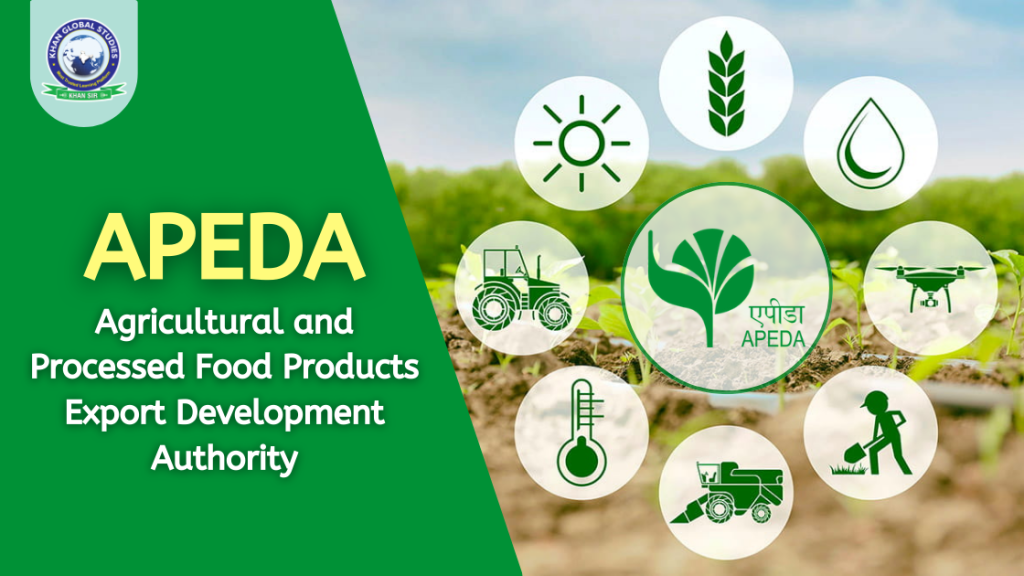Agricultural and Processed Food Products Export Development Authority (APEDA) was established by the Government of India under the Agricultural and Processed Food Products Export Development Authority Act passed by Parliament in December 1985. The Act (2 of 1986) came into force from 1986. A notification was issued in the Gazette of India on 13 February 1986: Extraordinary: Part-2 [Section 3(ii): 13.2.1986). The Authority replaced the Processed Food Export Promotion Council (PFEPC).
APEDA Overview
Agriculture currently comprises 13% of India’s total exports and 6% of its total industrial investment. The agricultural and processed food products industry is poised for growth due to government policies to promote the agricultural industry through soil health cards, storage facilities, agricultural infrastructure and irrigation policies.
Agricultural and Processed Food Products Export Development Authority (APEDA) was established under the Agricultural and Processed Food Products Export Development Authority Act to promote exports of agricultural and processed food products. This authority comes under the Ministry of Commerce and Industry, Government of India.
The list of products monitored by APEDA is as follows:
- Dairy Products
- Meat and Meat Products
- Fruits, Vegetables and their products
- Honey, Jaggery and Sugar Products
- Floriculture and Floriculture Products
- Alcoholic and Non-Alcoholic Beverages
- Poultry and Poultry Products
- grains and grain products
- Confectionery, Biscuits and Bakery Products
- Pickles, papad chutneys and much more
APEDA is tasked with assessing and improving the quality of agricultural produce, registering exporters, offering APEDA subsidies and promoting exports of agricultural and processed food products.
APEDA Registration Process
Persons involved in the export of products prescribed under the APEDA Act must apply to the Authority for Registration cum Membership Certificate (RCMC) within one month of the commencement of any such export.
Steps to Register Online
Step 1: Visit the APEDA website by clicking here and click on ‘Register as Member’ under the Online Services ‘Track System’ section on the home page.
Step 2: A pop-up window will open requiring IE code, company name, email address and mobile number. Fill the information and click on ‘Submit’.
Step 3: An OTP will be sent to your registered email address and mobile number to confirm the details. Enter OTP and click on submit.
Step 4: After filling the OTP the exporter has to fill the online application form and upload the required documents in JPEG or PDF format only.
Step 5: After filling in the sections, the exporter can save the information by clicking ‘Save’. The application form can be edited before making the payment.
Step 6: The exporter has to deposit the registration fee of Rs. 5000 + 18% GST Rs. 900 = Rs. 5900 through the following methods of payment:
- Debit Card
- Credit Card
- Demand Draft in favour of ‘APEDA’ – payable at the respective cities of APEDA offices.
- (APEDA GST Number – 07AAAJA1150H1ZU)
Step 7: Once the payment is made, an application number will be generated for further use.
Step 8: Once RCMC is issued, log in details will be sent to the exporter’s email address.
Step 9: Exporters can log in to the official website of APEDA using the details and check the application status by clicking on ‘Track Application’.
Step 10: Documents required along with the application form.
- A copy of the IE Code issued by DGFT, self-certified by the applicant
- A bank certificate duly signed and stamped by the branch manager indicating the name of the company, name of the owners, nature of the business activity, banking details and the experience of the bank in dealing with the company.
- Application form with the digital signature of the applicant
- A scanned copy of bank details and cancelled check may be asked by the officials while submitting the application form
- If an exporter wishes to be registered as a ‘Manufacturer-Exporter’, he has to obtain a relevant certificate from the designated authorities for different types of crops and submit a self-attested certificate along with the application form.
Note: There is no need to submit any document in hard copy for RCMC application.
Step 11: After approval of RCMC from the APEDA authority, exporters will take printouts of their certificate through their APEDA login under the heading ‘View RCMC Certificate’ under the RCMC menu by clicking here.
Working of APEDA
- To conduct the survey, a plan has been made to develop industries related to export-oriented products through financial assistance or other means.
- Individuals are registered as exporters of products after payment of any applicable duties. Establishment of specifications and standards to be used for the export of scheduled goods.
- Inspecting meat and other products in slaughterhouses, warehouses, processing facilities, means of transportation, or other areas where these products are handled or processed to maintain and guarantee their quality.
- Better packaging for regular products
- Expanding market research on scheduled products outside India
- Support for export-oriented manufacturing and promotion of scheduled goods
- Data was collected from factory owners or institutions specializing in the manufacturing, packaging, handling, marketing or export of products intended for export or from others who were referred to them on any topic related to products for export and publication. The data collected, or any part thereof, or a derivative of the location.
- Any other difference that can be defined.
Benefits of APEDA Subsidy and Registration
APEDA provides various types of financial assistance schemes and subsidies to exporters for the development of export infrastructure for processing, storage and transportation; Quality development and quality testing; and market development activities, such as market intelligence, participation in trade fairs, and high-quality packaging. Moreover, if applicants need any financial assistance for export businesses, they can avail of business loans from paisabazaar.com.
Benefits of APEDA Registration:
- APEDA certification is required for the export of scheduled goods.
- Various modes of financial assistance offered by APEDA are accessible to exporters.
- It assists exporters in marketing their brands through advertising packaging development as well as database updates and testing, among other services.
- Exporters can get information about various commodities and exporting countries.
- APEDA can register members to attend classes for various scheduled product categories offered by APEDA and as a result, enhance their efficiency.
FAQs
Question: What is the Full form of APEDA?
Answer: APEDA = Agricultural and Processed Food Products Export Development Authority.
Question: What is the function of APEDA?
Answer: APEDA is entrusted with the responsibility of export promotion and development of the following listed commodities: Fruits, Vegetables and their products. Meat and poultry products.
Question: What exactly is the APEDA Scheme?
Answer: The assistance provided under the financial assistance scheme of APEDA is accessible. Authorized Exporters and other organizations are listed under each sub-component and are available only for APEDA-scheduled products.
Question: What exactly is the purpose of APEDA return?
Answer: Export companies enrolled under APEDA will have to file export returns every month. It is calculated using the country in which the export is targeted and the nature and quantity of the product being exported to markets around the world.
Question: What exactly is Agri Exchange to APEDA?
Answer: We are pleased to introduce you to APEDA Agri Exchange – an APEDA online initiative, available at agriexchange.apeda.gov.in. An outlet for market data for Indian exporters and firm owners in global markets, as well as to assist Indian exporters in promoting and initiating simultaneous buying and selling globally.



